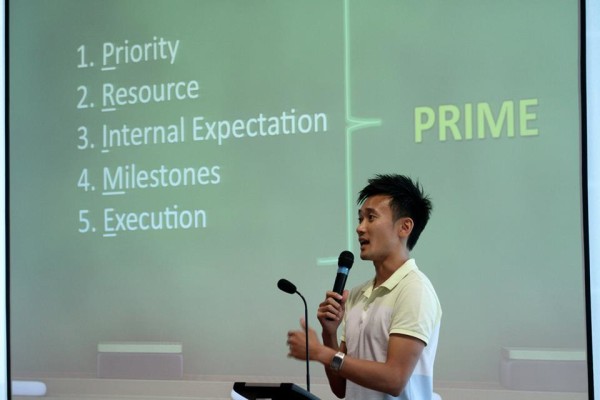At a running clinic organized by Earth Runners and Young NTUC last Saturday, local runner Melvin Wong, who is affectionately known as “The King” because he is the reigning champion of the “Adidas King of the Road” race, shared some pointers on how to plan a successful race.
Stressed Wong, “The definition of success varies though, from one person to another. Most people want to be fast and get their timings down. They want efficiency in running. But there are also people who like to enjoy and absorb the race atmosphere, and choose to take part in fun runs like Colour Run.”
Wong has five basic pointers to take into consideration in order to plan a successful race. This involves using the PRIME criteria, which stands for Priority, Resources, Internal expectations, Milestones and Execution.
-
Priority
Priority stands for what you prioritize in life, according to Wong. For example, do you put your top priority as your work, your family or your running? What are the considerations of your priorities and how do you choose what to place as more important? Different people place their priorities differently. For example, some people may prioritize their work first, while for others, their family time is the most important thing for them.
And if you want to take part in a race, how high up the pecking list are you going to place your training? If you are of the impression that you can run a race, whilst putting your training regime at the bottom rung of the ladder, you definitely are not going to run a successful race.
So according to Wong, a runner has to prioritize what is important in life, in order to plan a successful race.
-
Resources
The champion runner also talked about resources. These refer to what you have available at your fingertips and what options you have open to you at the moment, that you may be able to utilize. For example, do you know a friend who is a good and qualified running coach? Or do you have plenty of online resources at your fingertips – and will you be able to follow these to, for example, gear up for your next marathon? So decide on your resources during your planning.
-
Internal Expectations
Your internal expectations are what you’re hoping to get out of your running and training programme, according to Wong. This is different to the expectations of people surrounding you. For example, even though your family and friends think that you are training hard and that you are on course to set a new personal best timing, you may still disagree with them as you feel that your body is not ready. So decide on what your internal expectations are.
-
Milestones
Wong said, “It is a marvel to see how your body reacts at the end of a race, too. You may still be able to achieve a good timing, even though you felt that you weren’t prepared two weeks ago.”
Indeed, according to Wong, your running milestones are what you have achieved up to a certain point in time, and how you are progressing in terms of your running, as well as what you feel as though you are capable of, for the next time round. So decide on what your milestones are.
-
Execution
Execution, according to Wong, refers to your race strategy and how it actually goes for you on race day, regardless of the training that you have been through.
Said Wong, “Don’t get distracted by friends who do not share your race goals.” For example, if your friends are starting out the race too fast and your race strategy had been to plan a slow start, then you should carry this out rather than running so fast simply because your friends are doing so.
But then again, Wong added that on race day, there are some things that are impossible to control, such as the weather. What if it rains on race day and you have not trained yourself to run in the rain? Or what if the weather turns out to be scorching hot and you feel like wilting under the heat? In such cases then, Wong said that you have to improvise and make the most of a bad situation, to run the race as successfully as you possibly can. So the way you execute a race is important.
Click here for tips on ultra running by Kelly Lim.
Click here for tips on marathon running, by Soh Rui Yong.


Leave a Comment